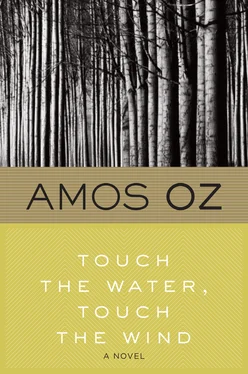Some years later Osip, the son of his old age, rose high in the ranks of the accursed Bolsheviks, and the turncoat sent his brother Mitya, who was an artist, to a labor camp in Siberia. Osip had perpetrated this outrage out of deliberate malice. For this deed the old man cursed his remaining child and said to him publicly on the Great Sabbath, The voice of your brother's blood cries against you, Cain, and he also said, Cursed and a servant of servants. He vowed that he would never see him again, and indeed he did not set eyes on him for nine years.
Only when Gershon Kumin succumbed to his unsavory disease, and the authorities began to move him from place to place because of the complaints of all those around him, had Osip intervened and had the old man transferred from sanatorium to sanatorium, from one hell to another, until finally their mutual disgust burst all bounds. Then Osip signed a document which enabled the old man to leave Odessa for good and go to his ancestral land, which was not, by any manner of means, even the palest shadow of what it should have been. So that his heart wept and his soul pleaded at night to soar skyward and seek out the heavenly Jerusalem and the true Promised Land.
Small wonder, then, that when Old Kumin heard on the radio and also read reports in two newspapers about Pomeranz's discovery, he hastily sat down and composed a letter in which he posed a number of questions to the esteemed mathematician:
1. Was it true, as reported in the Weekend Magazine, that the whole universe was expanding? And if so, where was it expanding to and at the expense of what was it expanding?
2. The writer understood nothing of mathematics and did not give a fig for mathematics. The only significant question for him was the question of infinity, and that only with one end in view: was there or was there not an afterlife? Would he kindly answer yes or no, and if no, would he kindly admit that all the fuss was about nothing, infinity was no infinity and the discovery was no discovery.
3. If the whole universe was in fact subject to fixed laws, what room was there for the "paradoxes" to which the article in the magazine referred? And if, notwithstanding, the discovery did involve "paradoxes," what authority was there for the arrogant assertion that the laws were in fact laws?
4. Why did scientists, even in the kibbutzim, shut themselves in ivory towers and preen themselves with all sorts of so-called "universal" questions, instead of combating the decadence and degeneracy in the country and in the government?
5. How much longer?
It was nine o'clock in the morning when Gershon Kumin stuck a New Year's greeting stamp, and an "express" sticker, and a "registered" label, on his letter, and went out to mail it.
By three o'clock in the afternoon he was feeling impatient: would he get a reply, when would it come, would it be an adequate reply? His questions suddenly seemed to him of absolutely unsurpassable urgency. He had an attack of indigestion, to boot. So he got into his brown check suit, put on a tie, tucked a white handkerchief into his breast pocket All without so much as a glance in the mirror. Then he snatched up his stick and hurried on his way, nodding his birdlike chin up and down all the while and muttering out loud, Yes, yes.
For five hours and fifty minutes the old man journeyed from bus to bus, from dusty bus station to dusty bus station, and in addition to the oppressive heat and the pain in his guts and his dripping ear he also began to be tormented by a feeling of furious self-hatred.
After sweeping northward through Samaria and the valleys like an evil spirit, he reached Galilee and alighted finally at Pomeranz's kibbutz. It was nine o'clock in the evening, and the old man was still as furious as when he had set out, if not more so. He immediately began to cross-examine two youths as to the whereabouts of the local sage and prophet. The stunned young men led him to Pomeranz's room. But at the very instant that Old Kumin's blurred gaze fixed on the square of light at the window, he suddenly underwent a change of heart. He was assailed by powerful misgivings. He may have recalled Tchernikhovsky's famous poem about the visions of the false prophets, or the contempt that the other great poet, Bialik, had heaped on the scoffers. In short, Kumin was filled with a terrible anger at himself, his letter, his stupid journey, revolutions, science, and youth in general.
Without a second thought he turned and strode through the night to the kibbutz gate. Somebody addressed him, inquired, spoke kindly to him, but he as usual did not hear, did not listen, took no notice. He found the winding road, and made his way back to the highway.
It was night. From the valley rose the snicker of frogs. The stars of Galilee shimmered. The gentle breeze seemed to sweep a delicate, stirring veil of light in its train.
The mountain air worked wonders for the old man. Suddenly he felt his lungs swell. An old song stirred in his heart. His journey was unexpectedly shortened: an army transport picked him up at the bus stop and whisked him quick as lightning southward, went out of its way for him and deposited him reverently outside the old people's home.
It was midnight when he went to bed. At two o'clock he was awakened by a vision of Galilee, the smells, the breeze, the wavering light.
Kumin lit his lamp and sat for two or three hours composing his famous poem "The Soul of the Hills," which has since been included in several school textbooks.
After he had written the poem Gershon Kumin's mind was at rest, his fury abated, even his digestive trouble improved somewhat, and, what was more, the dripping in his ear vanished without a trace. He had always detested miracles and suchlike, but on this occasion he permitted himself — after a serious inner debate — to employ for once the term "grace."
A week later he received a letter from his disinherited son Osip. As usual, he tore it up without opening it, without looking at it, without even sparing the rare stamps,and Bushed the pieces down the lavatory. But for once he felt a pang of remorse deep inside him: was he not a mean, selfish, insensitive old man, what moral right had he to explode, to cause offense and sorrow, to cast doubt on a brilliant discovery, and even suddenly to call Prime Minister Eshkol "troubler of Israel"?
He had a moral obligation to apologize at once. In writing.
Night in the beautiful German town of Baden-Baden.
The Dominican friary is surrounded by large walls and darkness. The chapel is deserted. Flagstones, wooden benches, high vaulting, biting cold. The organ is ringed with shadow. There is a slight restlessness in the air of the empty chapel. For several hours there has been no one here, no music, yet still something clings to the crannies in the walls. Majestic music has throbbed here, billows of melancholy grandeur, and now the ancient walls release it all like an invisible radiation. Four or five hours after the end of the Office, empty ancient chapels have a way of animating their darkness with vague stirrings. If the chapel is closed and not a candle is alight, and the thunder of the organ's yearning for celestial purity is broken up into distinct echoes, sound and silence, no-sound and silence, at such times the chapel should be left to itself. Not be disturbed.
A single candle burns in a cell in a wing of the friary. A man of middle years, broad of body and large of limb, stands at the small barred window of his cell and stares at the moon, or perhaps at the shadows of the lonely poplar trees outside shaking in the wind.
In his left hand he holds a large, heavy razor. A single candle glows on the chest of drawers behind him. Because of the candle the steel of the razor gives off sharp flickers of light. At times it flashes with a red fire.
Читать дальше

![Хироми Каваками - Strange Weather in Tokyo [= The Briefcase]](/books/29150/hiromi-kavakami-strange-weather-in-tokyo-the-br-thumb.webp)










